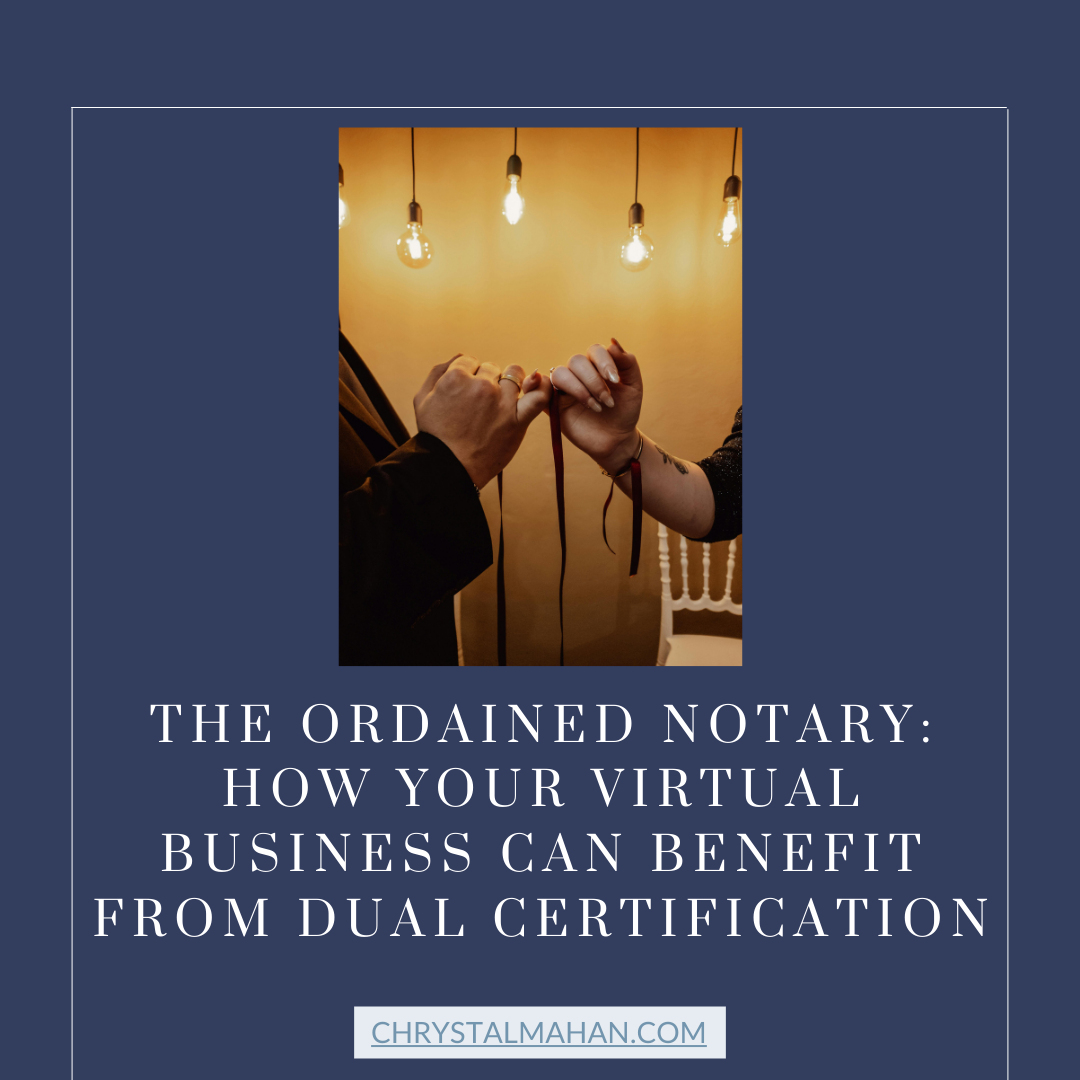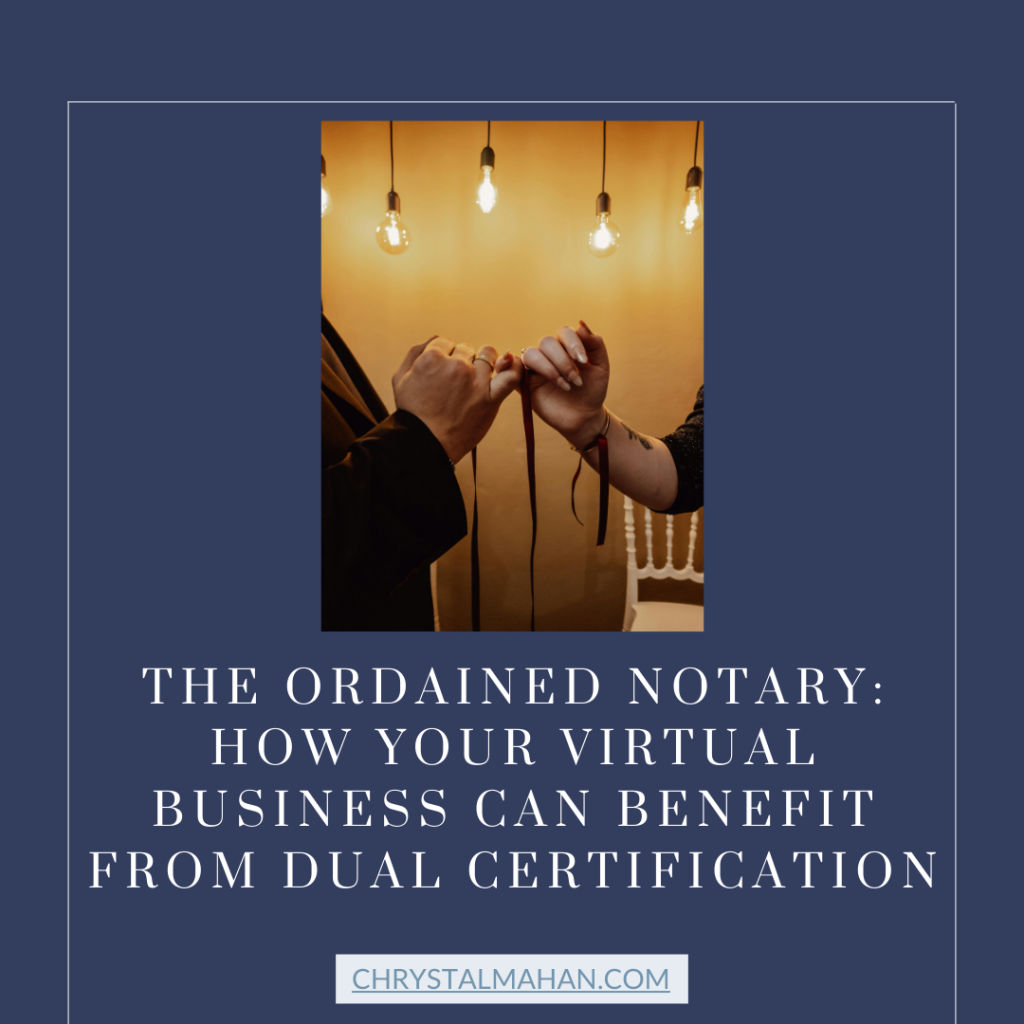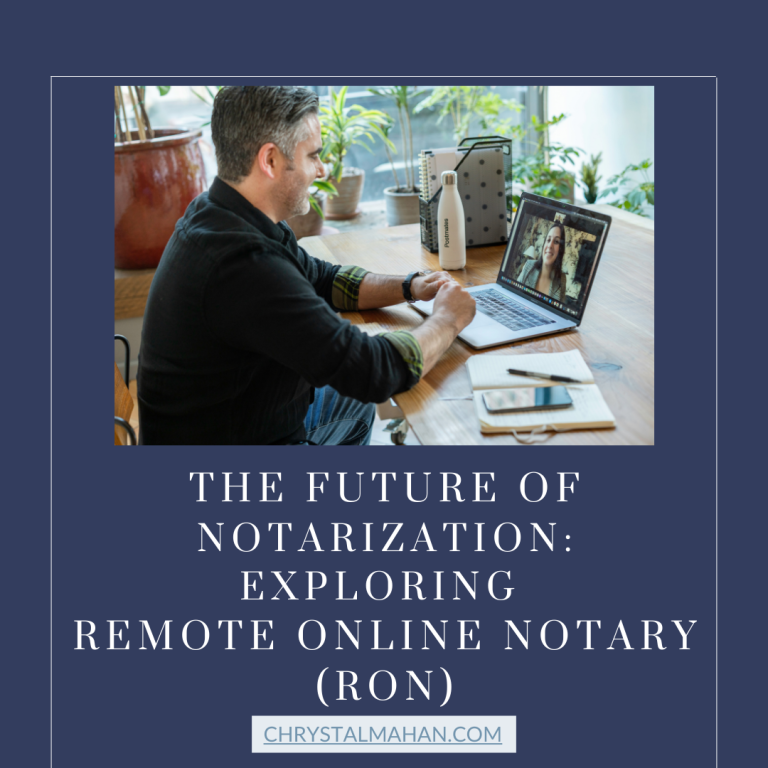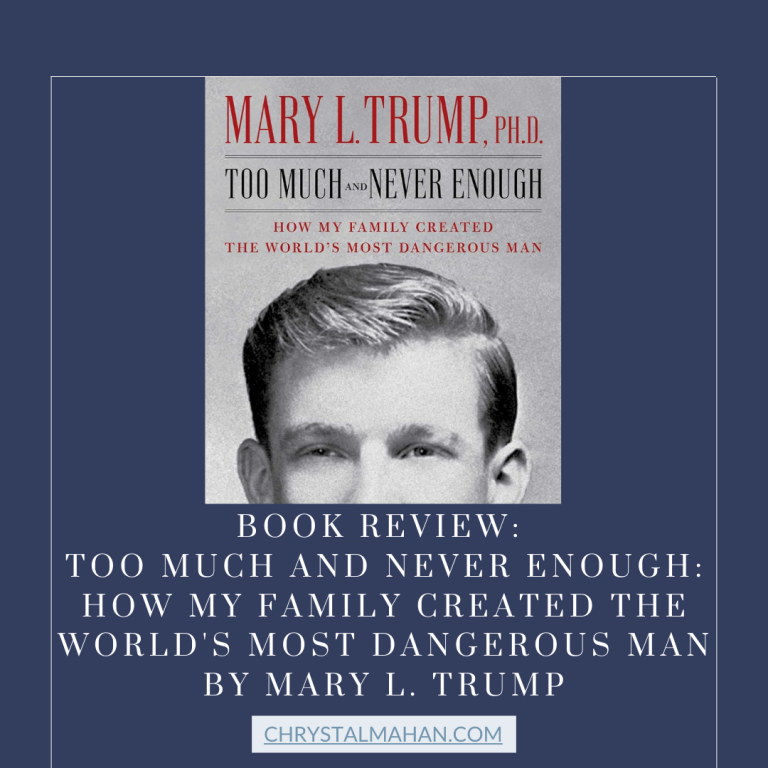The Ordained Notary: How Your Virtual Business Can Benefit from Dual Certification


Expanding services and distinguishing your business from competitors are essential steps for virtual notaries and legal assistants in building a loyal client base. One way to enhance your offerings and stand out is through dual certification as both an ordained minister and a notary public. This unique combination brings a fresh perspective to the traditional role of a notary, blending formal legal authority with a compassionate approach that appeals to clients facing significant milestones, from weddings to estate planning.
Imagine being able to offer clients not only the technical precision required in notarizing documents but also the added value of conducting ceremonies like weddings or memorial services. This dual certification isn’t just about enhancing your business and expanding your impact. Many clients appreciate a notary who can perform more than just administrative tasks, especially when these tasks involve major life events. The ordained notary provides a one-stop shop for those who prefer a seamless experience with fewer service providers.
Let’s explore how becoming an ordained notary can benefit your virtual business. From expanding service offerings to enhancing client relationships, this certification can add depth and professionalism to your business, enabling you to connect with clients more meaningfully.
The Intersection of Ordination and Notary Services
Ordination and notary certifications may seem worlds apart, but they have a unique synergy, especially in virtual legal assistance. A notary public provides essential, legally binding services by witnessing and authenticating documents, while an ordained minister has the authority to conduct ceremonies that hold deep personal significance for clients. Combined, these certifications allow a professional to perform legal and ceremonial services, which is particularly appealing to clients who value convenience and trust in a single provider.
Ordination adds a layer of empathy and personal connection to the legalities a notary provides. It signals to clients that their notary understands the legal weight of their documents and respects the emotional significance behind them. Whether a couple is seeking a wedding officiant who can also notarize marriage documents or someone is planning for end-of-life matters, this dual certification fosters a sense of trust and continuity that enhances the client experience.
This combination is also particularly beneficial for virtual assistants who aim to offer a full range of services. Ordination can transform a straightforward notarization business into a holistic service that addresses the technical and human aspects of life’s milestones. For clients, this means greater convenience and a deeper connection with a notary who is sensitive to their needs and able to support them fully during important transitions.
Enhancing Client Relationships Through Dual Certification
Clients who work with an ordained notary experience a unique level of trust and comfort. The ordination aspect signals a deeper commitment to ethical standards, compassion, and sensitivity, which can be incredibly meaningful to clients dealing with significant personal events. This empathetic approach can strengthen client relationships, as people feel more at ease working with someone who acknowledges the emotional aspect of notarizing life events.
As an ordained notary, you become more than just a service provider; you become a partner in your clients’ journeys. For example, a client arranging a wedding may feel comforted knowing their officiant can also legally certify the marriage documents. This seamless experience builds trust, encourages positive referrals, and often leads to long-term relationships with clients who appreciate the dual role.
Dual certification allows you to tap into a wider audience, especially clients who prioritize having a single, trusted individual manage their event’s legal and ceremonial aspects. This can lead to repeat business from clients seeking a reliable, empathetic professional for multiple needs over time, whether it’s a wedding, a real estate transaction, or a notarized document related to estate planning. Being both a notary and an ordained minister offers an invaluable sense of continuity, comfort, and professionalism that few other notaries can provide.
Expanding Service Offerings: What an Ordained Notary Can Provide
As an ordained notary, you can offer a variety of unique services that go beyond standard notarizations. This combination of certifications allows you to officiate at weddings, perform vow renewals, and even conduct commitment ceremonies. Additionally, it enables you to provide an all-in-one solution for clients needing both notarial services and officiant duties, which is especially beneficial for virtual assistants working with legal documentation for personal events.
This expanded service offering appeals to clients looking for convenience and a deeper sense of connection. For example, when a couple seeks an officiant for a virtual or destination wedding, having an ordained notary means they don’t need to involve multiple parties. They can work with a single, certified professional who can legally officiate the wedding and notarize marriage-related documents, simplifying the process and reducing stress.
In addition, dual certification enables you to provide services related to end-of-life preparations, a growing area of need among clients. By combining ordination with notary services, you offer clients compassionate support during difficult times. Being an ordained notary allows you to officiate memorials, notarize documents for estate planning, and provide guidance in a way that honors clients’ needs holistically, making your services invaluable for clients facing significant life events.
The Financial Benefits of Dual Certification for Virtual Notaries
Becoming an ordained notary can increase your earning potential by allowing you to charge higher fees for specialized services. As a dual-certified professional, you’re positioned to offer premium packages, including notarial and officiant services. This allows you to serve clients willing to pay for the added value of a compassionate and comprehensive approach, especially those who need support during emotional life transitions such as weddings or estate planning.
For instance, you might offer package deals that include both officiating and notarizing services for weddings or other ceremonies (check your state rules). These packages can be tailored to client needs, making your services more attractive to those looking for convenience and expertise in one place. Clients appreciate having a professional who can handle both the ceremonial and legal aspects of their important events, making them more likely to choose you over a standard notary service provider.
Additionally, being an ordained notary can set you apart in a competitive marketplace, making it easier to attract clients who value a provider with dual certifications. This distinction can result in higher rates, increased client referrals, and the opportunity to establish a versatile, empathetic professional reputation. For a virtual business, this advantage can translate to a more profitable, sustainable practice over time.
How Ordination Supports Ethical Standards in Notarial Services
Ordination, at its core, is a testament to a person’s commitment to ethical and compassionate service. For an ordained notary, this translates into a higher standard of care and professionalism that resonates with clients. Ordained notaries are seen as individuals who uphold a strong moral compass, which reassures clients who may be dealing with sensitive legal documents or life events.
This ethical commitment can positively impact client trust and business reputation. Clients seeking a notary for estate planning, wedding officiation, or end-of-life arrangements often appreciate the added sense of responsibility and respect that an ordained notary brings to the table. This ethical foundation fosters client confidence, making them more likely to seek your services for additional needs in the future.
Dual certification supports a sense of integrity and honesty, which are essential traits in the notary profession. Clients are likely to feel more comfortable knowing that their documents are being handled by a notary who is legally compliant and guided by a set of values and ethics reinforced through ordination. This aspect of your practice can lead to positive client testimonials and referrals, further establishing your reputation as a trusted, ethical professional.
Elevating Your Practice with Dual Certification: A Meaningful Approach to Notary Work
For virtual assistants in the notary business, dual certification as both an ordained minister and a notary can elevate your practice by enabling you to connect with clients personally and professionally. This combination of roles allows you to address your clients’ technical and emotional needs, making your services more holistic and fulfilling. Being an ordained notary adds purpose to your work, transforming routine tasks into meaningful engagements with your clients.
Clients today often seek professionals who can handle their legal and personal needs. When you are dual-certified, you’re better equipped to meet these diverse requirements, allowing clients to feel valued and understood. Whether notarizing a will or officiating a wedding, you become a trusted guide, supporting clients in some of life’s most pivotal moments.
If you want to learn more about how dual certification can enhance your virtual notary business, feel free to explore my blog or reach out directly. Discover how ordination can open doors to new services, strengthen client relationships, and make your work as a notary more impactful. Let’s discuss how dual certification can transform your practice into a fulfilling, trusted resource for your clients.
Like what you read? Drop me a line – let’s chat over virtual coffee.
~ Chrystal






